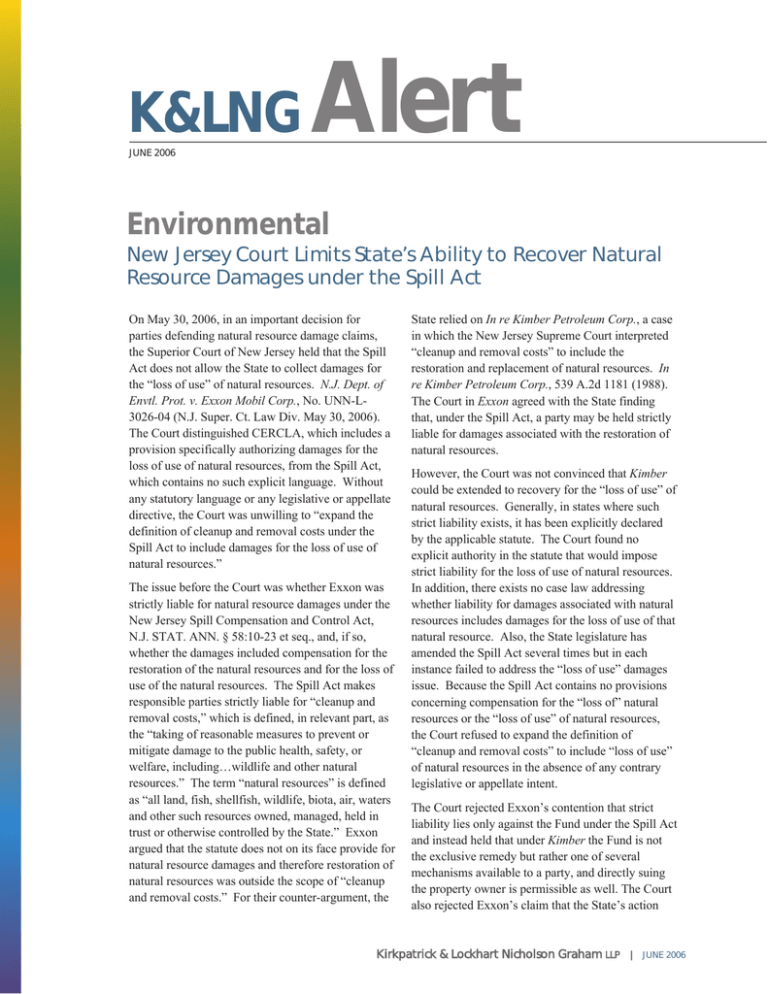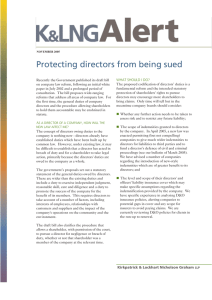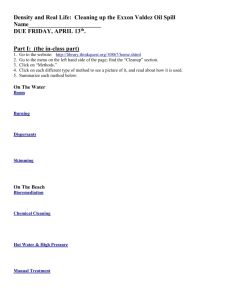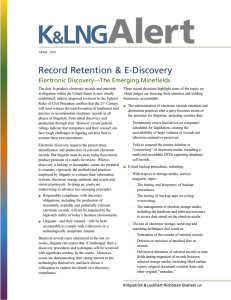
K&LNG
JUNE 2006
Alert
Environmental
New Jersey Court Limits State’s Ability to Recover Natural
Resource Damages under the Spill Act
On May 30, 2006, in an important decision for
parties defending natural resource damage claims,
the Superior Court of New Jersey held that the Spill
Act does not allow the State to collect damages for
the “loss of use” of natural resources. N.J. Dept. of
Envtl. Prot. v. Exxon Mobil Corp., No. UNN-L3026-04 (N.J. Super. Ct. Law Div. May 30, 2006).
The Court distinguished CERCLA, which includes a
provision specifically authorizing damages for the
loss of use of natural resources, from the Spill Act,
which contains no such explicit language. Without
any statutory language or any legislative or appellate
directive, the Court was unwilling to “expand the
definition of cleanup and removal costs under the
Spill Act to include damages for the loss of use of
natural resources.”
The issue before the Court was whether Exxon was
strictly liable for natural resource damages under the
New Jersey Spill Compensation and Control Act,
N.J. STAT. ANN. § 58:10-23 et seq., and, if so,
whether the damages included compensation for the
restoration of the natural resources and for the loss of
use of the natural resources. The Spill Act makes
responsible parties strictly liable for “cleanup and
removal costs,” which is defined, in relevant part, as
the “taking of reasonable measures to prevent or
mitigate damage to the public health, safety, or
welfare, including…wildlife and other natural
resources.” The term “natural resources” is defined
as “all land, fish, shellfish, wildlife, biota, air, waters
and other such resources owned, managed, held in
trust or otherwise controlled by the State.” Exxon
argued that the statute does not on its face provide for
natural resource damages and therefore restoration of
natural resources was outside the scope of “cleanup
and removal costs.” For their counter-argument, the
State relied on In re Kimber Petroleum Corp., a case
in which the New Jersey Supreme Court interpreted
“cleanup and removal costs” to include the
restoration and replacement of natural resources. In
re Kimber Petroleum Corp., 539 A.2d 1181 (1988).
The Court in Exxon agreed with the State finding
that, under the Spill Act, a party may be held strictly
liable for damages associated with the restoration of
natural resources.
However, the Court was not convinced that Kimber
could be extended to recovery for the “loss of use” of
natural resources. Generally, in states where such
strict liability exists, it has been explicitly declared
by the applicable statute. The Court found no
explicit authority in the statute that would impose
strict liability for the loss of use of natural resources.
In addition, there exists no case law addressing
whether liability for damages associated with natural
resources includes damages for the loss of use of that
natural resource. Also, the State legislature has
amended the Spill Act several times but in each
instance failed to address the “loss of use” damages
issue. Because the Spill Act contains no provisions
concerning compensation for the “loss of” natural
resources or the “loss of use” of natural resources,
the Court refused to expand the definition of
“cleanup and removal costs” to include “loss of use”
of natural resources in the absence of any contrary
legislative or appellate intent.
The Court rejected Exxon’s contention that strict
liability lies only against the Fund under the Spill Act
and instead held that under Kimber the Fund is not
the exclusive remedy but rather one of several
mechanisms available to a party, and directly suing
the property owner is permissible as well. The Court
also rejected Exxon’s claim that the State’s action
Kirkpatrick & Lockhart Nicholson Graham LLP |
JUNE 2006
was barred by the Spill Act, which sets a one-year
statute of limitations for claims against the Fund by
pointing to a recently added provision of the Spill
Act which specifically extended the statutory period
for natural resource damage claims under “the State’s
environmental laws.”
Finally, the Court rejected several of Exxon’s
additional defenses. First, the Court held that
Exxon’s Administrative Consent Order (ACO) with
the State covered remediation, not restoration costs,
and therefore there was no issue of doublecompensation if the State’s Spill Act claim prevailed.
Next, the Court concluded that the Court Rules do
not preclude a judgment of liability without present
evidence of natural resource damages because
plaintiffs were required to provide evidence of
natural resource damages at a later date.
Additionally, the Court also rejected, as a matter of
law, Exxon’s argument that it cannot be held liable
for spills that occurred before the effective date of
the Spill Act because, under the statute, all causes of
action are considered to have accrued after either the
statute’s effective date or upon completion of the
remedial investigation of the affected property,
whichever is later.
Until the legislature amends the statute or the
appellate courts decide otherwise, loss of use of
natural resources will not be recoverable as “cleanup
and removal costs” under the Spill Act. This holding
has important implications concerning the future of
natural resource litigation in New Jersey.
2
In other states, as well as jurisdictions that follow
CERCLA, the loss of use of natural resource
damages can result in large dollar claims by Natural
Resource Trustees. In New Jersey, the Department
of Environmental Protection’s aggressive initiative to
collect natural resource damages included the hiring
of lawyers on a contingent-fee basis. By precluding
“lost use damages,” the Superior Court of New
Jersey has eliminated this significant portion of the
State’s NRD claims. “Loss use damages” have been
criticized as highly speculative and greatly
responsible for enlarging the dollar amounts claimed
by Trustees. Although it is unclear how the decision
will affect pending and future lawsuits under the
Spill Act, it seems clear that the State’s NRD claims
brought pursuant to the Spill Act could have been
significantly reduced with the elimination of “loss of
use” damages.
William H. Hyatt
whyatt@klng.com
973.848.4045
Emily L. Won
ewon@klng.com
973.848.4054
Karyllan D. Mack
kmack@klng.com
973.848.4043
Robert F. Farley, summer associate, contributed to this
K&LNG Alert.
Kirkpatrick & Lockhart Nicholson Graham
LLP
|
JUNE 2006
If you have questions or would like more information about K&LNG’s Environmental Practice, please contact
one of our lawyers listed below:
BOSTON
Michael DeMarco
NEWARK
617.951.9111 mdemarco@klng.com
William H. Hyatt, Jr.
DALLAS
NEW YORK
Robert Everett Wolin 214.939.4909 rwolin@klng.com
Donald W. Stever
HARRISBURG
PITTSBURGH
R. Timothy Weston
717.231.4504 tweston@klng.com
LOS ANGELES
Frederick J. Ufkes
212.536.4861 dstever@klng.com
412.355.8612 rhosking@klng.com
SAN FRANCISCO
310.552.5079 fufkes@klng.com
MIAMI
Daniel A. Casey
Richard W. Hosking
973.848.4045 whyatt@klng.com
Edward P. Sangster
415.249.1028 esangster@klng.com
WASHINGTON
305.539.3324 dcasey@klng.com
Barry M. Hartman
202.778.9338 bhartman@klng.com
www.klng.com
BOSTON • DALLAS • HARRISBURG • LONDON • LOS ANGELES • MIAMI • NEWARK • NEW YORK • PALO ALTO • PITTSBURGH • SAN FRANCISCO • WASHINGTON
Kirkpatrick & Lockhart Nicholson Graham (K&LNG) has approximately 1,000 lawyers and represents entrepreneurs, growth and middle market companies, capital
markets participants, and leading FORTUNE 100 and FTSE 100 global corporations nationally and internationally.
K&LNG is a combination of two limited liability partnerships, each named Kirkpatrick & Lockhart Nicholson Graham LLP, one qualified in Delaware, U.S.A. and
practicing from offices in Boston, Dallas, Harrisburg, Los Angeles, Miami, Newark, New York, Palo Alto, Pittsburgh, San Francisco and Washington and one
incorporated in England practicing from the London office.
This publication/newsletter is for informational purposes and does not contain or convey legal advice. The information herein should not be used or relied upon in
regard to any particular facts or circumstances without first consulting a lawyer.
Data Protection Act 1988—We may contact you from time to time with information on Kirkpatrick & Lockhart Nicholson Graham LLP seminars and with our regular
newsletters, which may be of interest to you. We will not provide your details to any third parties. Please e-mail cgregory@klng.com if you would prefer not to
receive this information.
© 2006 KIRKPATRICK & LOCKHART NICHOLSON GRAHAM LLP. ALL RIGHTS RESERVED.
Kirkpatrick & Lockhart Nicholson Graham
LLP
|
JUNE 2006





